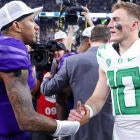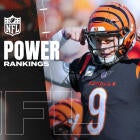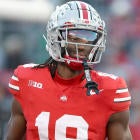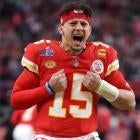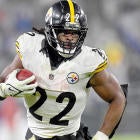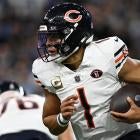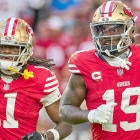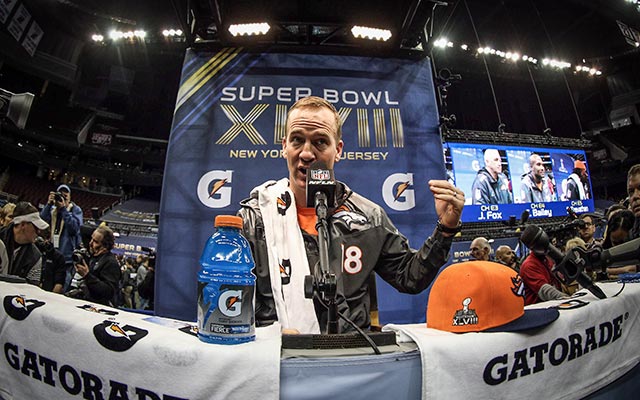
More SB coverage: XLVIII odds | Expert picks | Super Bowl weather | Latest news
When Peyton Manning takes the field Sunday at MetLife Stadium for Super Bowl XLVIII, he'll do so in relatively benign conditions. The New York-New Jersey area endured snow, ice and freezing temperatures in recent weeks, and it was enough to send the media into full-on doomsday prepper mode.
But from the perspective of Wednesday, Manning can expect temperatures to be in the mid-30s by kickoff and drop into the high 20s later in the evening with only a 20 percent chance of precipitation. More importantly, wind doesn't appear to be a factor, only blowing at 6-9 mph.
(Our Super Bowl pick doesn't hinge on whether it's snowing but if it's windy. Because if Manning was tasked with throwing in 25-plus mph winds, that would favor the Seahawks' stout running game and dominating defense. But if Manning can open the offense up -- and it looks like he can -- it makes the Broncos an attractive pick.)
We mention all this not because the two Super Bowl teams -- Denver and Seattle -- aren't accustomed to inclement weather, but because of the tired storyline that Manning goes from one of the best quarterbacks in NFL history to Brandon Weeden whenever the weather turns.
We first addressed this back in early December where we noted that much of this thinking goes back to Manning's inability to beat the Patriots in the postseason following the 2003 and 2004 seasons.
Clearly, that wasn't an issue in the AFC Championship game 10 days ago where the Broncos cruised to a 26-16 win. Yes, it was 63 degrees and Manning was his usual clinical self, but Tom Brady, who finished 24-of-38 for 277 yards with 1 TD and 0 INTs, can't even blame the weather for his inability to hit several wide-open receivers.
There's also this, via Will Brinson: Despite the postseason struggles early in his career, Manning has out-Brady'd Brady the last five years.
|
Quarterback
|
Record
|
Comp %
|
Yards/Game
|
Yards/Attempt
|
TDs
|
INTs
|
|
Peyton Manning
|
4-3
|
68.8%
|
300.1
|
7.61
|
2.0
|
0.7
|
|
Tom Brady
|
4-5
|
61.4%
|
274.4
|
6.96
|
1.9
|
1.1
|
So with an extra week on our hands and not much to talk about beyond Richard Sherman calling out Michael Crabtree, we took a closer look at Manning's playoff performances.
(Note: table headings: Opp = opponent, PM_score = points scored by Manning's team, OTH_score = points scored by opponent, margin = margin of victory, Y/A = average yards per attempt; playoff games are in blue.)

Above are the 23 games -- both regular season and playoffs -- in which the temperature at kickoff was below 40. You'll notice that the table is sorted from coldest game (11 degrees in Week 17 of the 2008 season against the Browns) to the "warmest" (39 degrees in Week 13 of the '07 season against the Ravens). The first-glance takeaway: Manning may have lost more when the temperature dipped, but that, in general, appears to be a function other than his performance.
(As we've noted previously, basing a quarterback's success solely on wins is a silly exercise, and it doesn't tell us anything about the other 45 players on the active roster who may have had a hand in the outcome.)
Because the margin of victory remained relatively constant across temperatures (see the last four rows of the table below where the numbers are broken out by temperatures less than 20 degrees, between 20-29, and 30-39), but more importantly, Manning played better when the mercury never reached 20 degrees. He completed 70 percent of his throws for, on average, 261 yards, 2.3 TDs and 1 INT. And his passer rating of 87.5 was higher than in other cold-weather games.
Obviously, there's more to the story. Once we order Mannings' performances by year instead of temperature, it reinforces the fact that, despite narratives we've heard for weeks now, cold weather isn't an issue for the 37-year quarterback who underwent four neck surgeries in 2011.

Notice that in the last 10 years Manning's teams have scored more points than they have allowed even though temperatures, on average, hover around 30 degrees. His completion percentage also improved notably, as did his TD/INT ratio and his QB rating.
There are mitigating factors, chief among them the strength of the opposition. It stands to reason that, on average, playoff teams will be better than a regular-season opponent.
Here are Manning's regular-season numbers:
* 167-73 record
* Average temperature: 45 degrees; average winds: 11 mph
* Average margin of victory: 5.7 points (27.1 for Manning's teams, 21.4 for the opponents)
* 23-of-35 for 270 yards, 2.1 TDs, 0.9 INTs, 97.8 QB rating
And here are Manning's playoff numbers:
* 11-11 record
* Average temperature: 57 degrees; average winds: 9 mph
* Average margin of victory: 3.4 points (24.0 for Manning's teams, 20.6 for the opponents)
* 24-of-38 for 286 yards, 1.6 TDs, 1.0 INTs, 90.1 QB rating
This is all a longwinded way of saying Manning won't be any more affected by the weather than Russell Wilson, or any other quarterback for that matter.
And AdvancedNFLStats.com's Brian Burke confirms as much. In Jan. 2012, he wrote that "Home teams have an advantage across the temperature spectrum, which appears to be exaggerated at extreme temperatures."
Burke added: "The big takeaway should be that temperature does in fact hurt the passing game. ... [O]ne thing we can tell is that the colder the weather the lower the passing efficiency for all types of team climates."
First, the Super Bowl isn't technically a home game. And again, the weather isn't expected to be an issue. And even if it was, there's no evidence that Manning and the Broncos would be at a disadvantage. In other words: Ignore the narrative and enjoy the final football game of the 2013 regular season.













